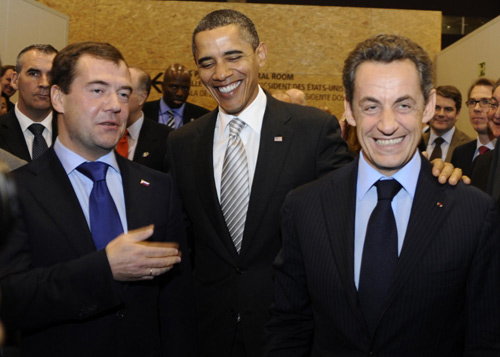Global General
Russia to join NATO new anti-missile plan
(Xinhua)
Updated: 2010-11-21 09:08
 |
Large Medium Small |
 |
|
Russia's President Dmitry Medvedev (L) speaks with France's President Nicolas Sarkozy (R) and US President Barack Obama (C) during the second day of the NATO Summit in Lisbon, Nov 20, 2010. [Photo/Agencies] |
Russia has long been suspicious of American-led plans for an anti-ballistic missile (ABM) shield, believing it could undermine the nuclear balance of power by giving the NATO the ability to neutralize its missiles. When the Bush administration first proposed basing elements of its ABM system in Poland and the Czech Republic, Moscow responded with fury -- threatening to re-target its nuclear weapons at the European nations.
Since coming to power last year, US President Barack Obama has modified the plan and sought to allay Russian concerns. Washington insists the defenses pose no threat to Russia's nuclear deterrent but are needed to defend Europe and North America against the danger of attack from Iran or elsewhere in the Middle East.
At the meeting in Lisbon, Medvedev at least agreed to talk about NATO's offer of cooperation in the development of the missile defenses. But he seemed far from convinced and Russia's ambassador to NATO on the eve of the summit suggested that the scale of the NATO plan continued to indicate a potential threat to Russia.
Despite the nuanced Russian reaction to the missile plan, allied leaders were encouraged by agreements on another of other issues.
Moscow has widened a transit accord to allow NATO to transport non-lethal material to and from Afghanistan through Russian territory. The two sides will operate a new center for counter-narcotics training in an effort to help Afghanistan's neighbors stem the flow of heroin out of the country. Russia will consider helping the Afghan armed forces with helicopters and may play a greater role in maritime missions against terrorists in the Mediterranean or pirates off the coast of Somalia.
"I think that the cooperation with Russia will be a milestone along NATO's way," said German Chancellor Angela Merkel. "You can see that a former military opponent is becoming a partner. You can call this change in the way we are cooperating historic."
Obama said NATO now sees "Russia as a partner not an adversary. " Even Medvedev acknowledged that, "talking about the current state of affairs, they are not bad."
The threat to the START deal however cast a shadow over the summit. Leader Republican Senator John Kyl has said the Congress does have time to ratify the treaty this year. If it is pushed back to January, the opposition Republicans, strengthened by last month's mid-term elections, will have more chances to vote down the treaty signed by Obama and Medvedev in April. The treaty would reduce the strategic nuclear weapons stockpiles of both nations.
"This is an issue of critical national security interest," Obama told a news conference in Lisbon, restating an appeal to the Republicans not to allow partisan politics to derail the treaty.
NATO allies backed Obama's appeal. In a joint statement with Medvedev, they urged the treaty's early ratification and entry into force.



